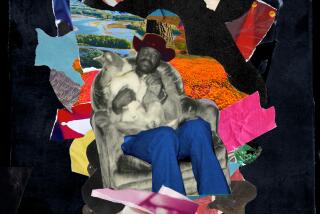Playing to the Colorful Tunes of His Life : HAVE MERCY! Confessions of the Original Rock ‘n’ Roll Animal <i> by Wolfman Jack with Byron Laursen</i> ; Warner Books $21.95, 363 pages
- Share via
The sudden death of outlaw deejay Wolfman Jack in July elevates his newly published autobiography, “Have Mercy!,” from a pop-bio into something of a testament.
And, as it turns out, “Have Mercy!” is one celebrity memoir that can also be read as a morality play. On the very first page, Wolfman Jack describes the deal that he struck with the devil, a deal that captures the huckstering spirit of American pop culture.
Wolfman Jack confesses: “I became a little salesman for myself, just like later on I would become a salesman for rhythm and blues music, for rock ‘n’ roll . . ., for oldies record packages, genuine Wolfman Jack roach clips, all the hundreds of things I’ve pushed and promoted in my life.”
Like most rock ‘n’ roll sagas, the liveliest moments in “Have Mercy!” hark back to the dues-paying years of the ‘50s and early ‘60s, when an ambitious young man from Brooklyn named Bob Smith invented himself as deejay-of-all-trades and then reinvented himself as Wolfman Jack.
Right from the start, young Smith supplemented his meager earnings as a deejay by pushing marijuana and prostitutes in his off hours. What he regretted most, however, were the compromises that he made in pursuit of a radio career.
For example, Smith started out playing music by black artists on a Virginia radio station in the early 1960s--and he survived a change of format only by abruptly changing his own colors.
“To this day,” writes Smith, “I feel a lot worse about cracking open a mike and announcing, ‘Good morning. This is Roger Gordon bringing you Music in Good Taste ,’ than I do about the fact that I was transporting weed and brokering mattress action on the side.”
The very best stuff in “Have Mercy!” is Wolfman Jack’s vivid recollection of his early years in “border radio,” the Mexico-based stations that blasted their signals throughout North America. Indeed, Chapters 7 and 8, which describe how he put himself on the air as Wolfman Jack in 1963, suggest a white-hot rock ‘n’ roll epic that draws on elements of “The Buddy Holly Story,” “The Wild Bunch” and “Barbarians at the Gate.”
By the ‘70s, however, Wolfman Jack had already turned from an underground hero of pirate radio into a merchandised pop-culture icon. Soon after he was invited to play himself in George Lucas’ “American Graffiti,” he was fully co-opted by the corporate media, which defanged him but paid him well to fake the feral sounds that once made him a truly grotesque and dangerous figure.
Still, somewhere behind the boast and bluster and bravado, a certain innocence and wonder are detectable in “Have Mercy!,” as if Bob Smith occasionally allows us to see a street-smart but essentially decent man.
“Folks, I’m real nervous about getting this book right ,” he confesses early in these pages. “One thing I’ve never done--which made me more scared than the most nervous virgin you ever met--was to sit down in a quiet place in front of blank paper and try to make sense of my life.”
So we understand that Wolfman Jack has set himself a lofty goal; he vowed to tell it like it really is, an oft-quoted but seldom-realized credo of rock ‘n’ roll. Happily, if amazingly, Wolfman succeeded in getting it right , and just in time.
More to Read
Sign up for our Book Club newsletter
Get the latest news, events and more from the Los Angeles Times Book Club, and help us get L.A. reading and talking.
You may occasionally receive promotional content from the Los Angeles Times.










